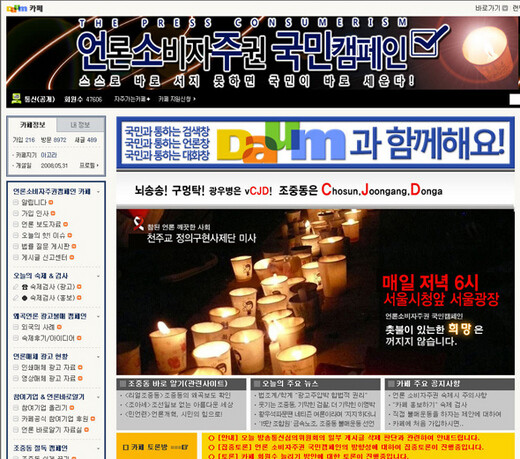hankyoreh
Links to other country sites 다른 나라 사이트 링크
KOCSC’s ruling on newspaper boycott campaign incites resistence

The Korea Communications Standards Commission ruled on July 1 that Internet users should delete information related to a boycott of companies that advertise in the nation’s three major conservative newspapers, sparking controversy that the ruling violates the freedom of expression.
Many experts say that the KOCSC, a independent body under the law, has abused its power by defining as illegal a campaign to boycott companies that advertise with the Chosun Ilbo, JoongAng Ilbo, and DongA Ilbo, and proposing restrictive measures for related articles posted on the Internet.
In its ruling, the KOCSC said that the boycott campaign constituted an “unauthorized infringement of the rights of others” and classified the related Internet comments as “distribution of information that encourages illegal activities.” The ruling also defined the boycott campaign as “unlawful. Therefore, posting articles encouraging illegal activities on the Internet is illegal as well.”
In discussing the KOCSC ruling, Jo Guk, a law professor at Seoul National University, said, “All consumer movements violate the rights of others, but the issue is whether the purpose is just. The boycott of companies advertising in the newspapers is an expression of consumer complaints about distorted reports. It can’t be classified as an unauthorized infringement of the rights of others.” Jo’s point is that, for new issues such as this, the KOCSC should have made a more prudent decision because there is no precedent for a boycott of this nature.
Some experts say that it is also a problem that there is no way to avoid the KOCSC ruling. If the KOCSC rules certain information as illegal and demands it be deleted, the IT companies have no choice but to follow the KOCSC ruling. Many law experts say that allowing KOCSC to have this kind of administrative power could infringe upon the Constitution.
Media organizations are protesting the KOCSC ruling, saying that they will take legal action against it. An organization formed by 48 media organizations and civic groups issued a statement on July 2, in which they said that the KOCSC had “delivered a political ruling and is exercising excessive authority.” The group says it will file a lawsuit against the KOCSC ruling, which they say “violates the freedom of expression.”
In the meantime, some Internet users are taking refuge in a kind of “cyber exile” by using foreign Internet sites to share information on the boycott campaign. One Internet user posted instructions for continuing the campaign on the Internet portal Daum’s debate forum Agora, which has been a popular forum for discussion about the beef agreement and other current events in Korea. According to the instructions, the protest will be carried out on Agora, moved to an alternative Internet site called Agorian that is hosted by a domestic server and then moved to a foreign site with the name Global Candles.
Internet users have created a forum called Google Agora in Google Groups, which also functions as a forum for debate. Google does not demand personal information, such as the resident registration number demanded by other Internet sites, from those who want to become registered users of the site, so the possibility is very low that comments posted on Google will become targets of the prosecution’s investigation or deleted at the request of the authorities. China is the only country that Google allowed to censor information posted on the Internet, a request Google accepted in 2006. Shortly thereafter, Google faced criticism from the international community for breaking basic principles of free speech to provide service in China.
The KOCSC says it will take complete control of distribution of information through the Internet but it is highly possible that such an attempt will not be effective considering the nature of the Internet.
The Internet sites discussed in this article can be found here:
Daum Agora: http://agora.daum.net/
Agorian: www.agorian.kr
Global Candles: www.globalcandles.org
Google Agora: http://groups.google.com/group/googleagora
Please direct questions or comments to [englishhani@hani.co.kr]
Editorial・opinion
![[Column] Park Geun-hye déjà vu in Yoon Suk-yeol [Column] Park Geun-hye déjà vu in Yoon Suk-yeol](https://flexible.img.hani.co.kr/flexible/normal/500/300/imgdb/original/2024/0424/651713945113788.jpg) [Column] Park Geun-hye déjà vu in Yoon Suk-yeol
[Column] Park Geun-hye déjà vu in Yoon Suk-yeol![[Editorial] New weight of N. Korea’s nuclear threats makes dialogue all the more urgent [Editorial] New weight of N. Korea’s nuclear threats makes dialogue all the more urgent](https://flexible.img.hani.co.kr/flexible/normal/500/300/imgdb/original/2024/0424/7317139454662664.jpg) [Editorial] New weight of N. Korea’s nuclear threats makes dialogue all the more urgent
[Editorial] New weight of N. Korea’s nuclear threats makes dialogue all the more urgent- [Guest essay] The real reason Korea’s new right wants to dub Rhee a founding father
- [Column] ‘Choson’: Is it time we start referring to N. Korea in its own terms?
- [Editorial] Japan’s rewriting of history with Korea has gone too far
- [Column] The president’s questionable capacity for dialogue
- [Column] Are chaebol firms just pizza pies for families to divvy up as they please?
- [Column] Has Korea, too, crossed the Rubicon on China?
- [Correspondent’s column] In Japan’s alliance with US, echoes of its past alliances with UK
- [Editorial] Does Yoon think the Korean public is wrong?
Most viewed articles
- 1‘We must say no’: Seoul defense chief on Korean, USFK involvement in hypothetical Taiwan crisis
- 2N. Korean delegation’s trip to Iran shows how Pyongyang is leveraging ties with Moscow
- 3‘Weddingflation’ breaks the bank for Korean couples-to-be
- 4[Column] Park Geun-hye déjà vu in Yoon Suk-yeol
- 5Korea sees more deaths than births for 52nd consecutive month in February
- 6[Guest essay] The real reason Korea’s new right wants to dub Rhee a founding father
- 7[Column] The clock is ticking for Korea’s first lady
- 8[Column] Has Korea, too, crossed the Rubicon on China?
- 9Why Korea shouldn’t welcome Japan’s newly beefed up defense cooperation with US
- 10Will NewJeans end up collateral damage in internal feud at K-pop juggernaut Hybe?